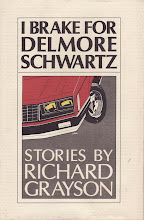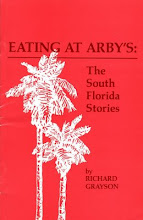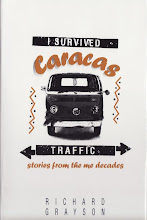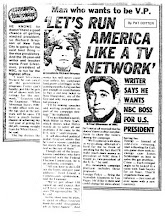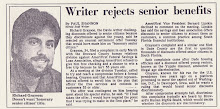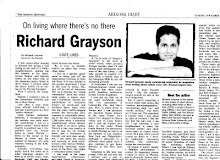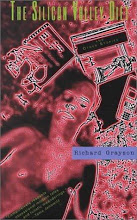(Videos courtesy Philip M. Goldstein)
Tuesday, May 31, 2011
Sunday, May 29, 2011
Edwin Honig, RIP

We had a nice time this morning at Dobson Ranch Park but felt sorrow upon reading there an obituary notice for the great poet and translator Edwin Honig, who was not only a first-rate writer but someone we liked and deeply admired from the time we met him at The MacDowell Colony in the summer of 1980.
Actually, we'd appreciated Edwin Honig's writing before that because we'd discovered his work in the late 1970s when it appeared in some of the little magazines we read (and sometimes appeared in ourselves). He was then the age we are now, and he'd had a long and productive career both behind him and still ahead of him.
We took walks and talked about growing up in Brooklyn -- Ed's mother was still living in Brownsville then -- and discussed literature and other subjects. He was working with another MacDowell fellow, the talented (and extremely nice) composer Anne LeBaron for whom he produced the text for Lamentation/Invocation, for baritone, clarinet, cello and harp.

Here is the full obituary by Richard C. Dujardin from the Providence Journal:
Edwin Honig, a poet, playwright and translator who taught at Brown University for a quarter century before retiring in 1983, died at his home on the East Side Wednesday after a lengthy battle with Alzheimer’s disease. He was 91.
Honig once told former Providence Journal columnist Wanda Howard that he was 13 when an alert teacher at the high school he was attending in Brooklyn, N.Y., introduced him to poetry, putting him under the influence of such writers as Hart Crane, T.S. Eliot, and Gerard Manley Hopkins. [Our note: it was Abraham Lincoln H.S., where his early poetry appeared in the 1935 literary magazine and year book.]
Thanks to his grandmother who spoke Spanish, Arabic and Yiddish but little English, he said, he also developed an intense lifelong interest in Spanish and Portuguese.
All together, he wrote 10 books of poetry, 3 plays, 5 books of criticism and 8 translations, one of the earliest of which was on Federico Garcia Lorca, the Spanish poet murdered by Franco’s fascists in Granada. It was published in 1944. Four decades, later he was knighted by the president of Portugal for helping to introduce Fernando Pessoa to the English-speaking world and was similarly honored in 1996 by the king of Spain for his translations of Spanish poets and playwrights.
Honig, who taught at Harvard University before going to Brown, received awards from the Guggenheim Foundation, the Mishkenot Sha’Ananim in Jerusalem, the National Endowment of the Arts and the Academy and Institute of Arts and Letters.
He would later compile nearly a half-century of his poems in a volume titled “Time and Again,” and was working on a second volume, “Over Time,” when he became ill.
In “To Restore a Dead Child,” he released decades of sorrow over the death of his 3-year-old brother who was run over by a truck when Honig was just 5.
“Honig has been a poet whose sorrow is always coming home ... No poet of our time has more fiercely presented man’s tragic mortality even as he finds an impressive variety of means by which that mortality is admitted and sublimed,” wrote Daniel Hughes in the Dictionary of Literary Biography.
He was the husband of the late Charlotte Gilchrest, who died of cancer in 1962, and the ex-spouse of Margot Dennes, from whom he was divorced. He is survived by a sister in Colorado, Lila Putnam, and by two sons, Daniel and Jeremy, and was cremated in a private service Thursday. Brown University said it plans a memorial service in Honig’s honor in the fall.

When we first met Edwin Honig, he was working on what would become the poem of his we treasure most. We reprint it here:
To Restore a Dead Child
1
1925
Sometimes while I sleep
I hear the single cry and tire screek
that never end.
My blond and foolish brown-eyed brother
lugging his fretful love
shambles after me
as the cunning Mack truck
lurching out of nowhere
cuts him down.
He's a long dead almost-three.
I'm a long lived five
just turned sixty-one
still running in a dead heat
with the rolling cab that swooped him up
heading for the vanished hospital.
It's then on waking
I feel the snot of infant faces
leak into my mouth.
2
Hearing it wake, we feel
the windy calling to each other
of the kindred sleep and death
in the morning opening
of the eyes of country horses,
the odor of earth's dampness
in the crystal tree light,
and the touch of rough bark
on fingertips.
Seeing it, we feel again
the worn heart welcoming
the slow envelopment of dark,
the falling off of sight
in the old gray house,
when sun's heat passes
and the first breeze
lifts a faint dust
along the hedges.
Remembering, again we see
the embers crumbling in the grate,
the fire flaring up again,
the pause before the turning shadow
spans the polished floor
and drifts into the open world,
a street that wanders
endless as a silent grief
that will never know itself.
3
We walked out of time
into the woods of pain
and never seemed
the same again.
We tilted with the hope
of finding ourself
in another skin,
and bent on recovering,
turned with open eyes
to find welcome in the arms
of a dead brother --
sleeping his dream of being,
a dream so long unfulfilled
there was no time
even to begin to live it,
till in his own hope
we lived what we believed
may have been
reserved for him.
4
Watching the immense self scattering ocean
ruffle out before us,
our wonder stirred and time became
an intricately formal mating,
night on day on night,
a repeated wave flash
signaling the act and its abating,
and the last long rolling into shore
turned into a fresh aspiring
of newborn creatures
to join the greater mating
sky and ocean,
and the creatures reeling beyond our wonder
mingled with the lifetimes
of our aged parents, each one apart,
our cheerful sister's pregnant daughter,
also apart,
and this briefly sunlit reawakening
stung alive the still unanswered
black and blueness
we never would be clear of --
though no longer cherishing
the old bruised core,
no longer poised against
the battering disablements,
we simply gazed again
and let our wonder live again,
and die.
5
For everyone the call of light,
seeing figures of the creatures
from the mountain and the sea:
an eagle flying and a snake
whipping past the chicken coop,
a horse neighing in a flash
of meadow, with wayward water there
to slake the thirst a moment.
As light descends,
following the slow shapes
bulking briefly in their place,
it makes as if to stop
and give them way and cause,
as if to stroke
and praise their substance fully
before each creature
passes into its own remove
with rapid smile print
(as on your face and mine appears
held there by heads soon to be
no longer yours or mine)
till it lets the shadow quicken,
overtake the bobbing bulks,
and rise immensely over
like a mercy to devour them.
6
As we would have it,
it would be nothing simple
or profound,
nothing easily attained,
long worked for or perfected.
It would be of a wholeness,
full and large and figured
in its substance.
It would be all engrossing
to itself and others --
like the playing of a mindless tune
between a richer music
and a silence:
a peaked and dribbling sound,
a sound wavering in descent
but kept in measure,
and in that measure
letting all know
how deeply it could love
the silence following.
7
Not to be listening
yet to be heard
in the huge inconsequences
of the heart,
where having conveyed
the full measure of our hate
as a gesture of belief
in something worse than ourself
is barely to have escaped
self murder,
the intended sacrifice
become the bound body of love
in a younger self --
wearing a brother's features
still scored through
the dead boy's memory --
forever jammed between
the tonnage of his death
and self hate's last convulsions,
like the lost deserter
fixed in an ice cake
some intruder yells up
early one spring.
8
As the light descended
the night was pierced a moment
and there was seen
in the vagueness of a shadow
a form more his
than our idea of him,
and the shadow wobbled
into a figure merging
with the hope of his lost being
come to be again,
as we tried swiftly to put on
the dark loose patches
fallen from him in the light --
trying to fill and fill
all that was left
of his living clothes
before his body vanished
9
No longer would he have to run
each time we left him
before our mindless going
struck him
as needing to be answered,
and the need make him
fly to us
and press his body
on us briefly.
For now, if again we left
without a smile or hand wave,
he would no longer need to fret
or wonder how to weight the meaning
since as last reminder
he had left
his body printed on us.
Here is a clip of this great poet in the 2010 film by his cousin Alan Berliner, Edwin Honig: A Poet's Alzheimer:
We will miss him and always treasure his work.
Sunday Morning in Mesa: Breakfast at Dobson Ranch Park

After going to the nursing home to see our mom for her breakfast, we drove west on the Superstition Freeway to Dobson Road, where we lived just south of the freeway from August 2000 to May 2011 at 1651 S. Dobson Road

and went to the Starbucks next door to our old apartment complex (it was called Quail Creek back in the day) to get iced tea, oatmeal and the Sunday New York Times

which we took down to Dobson Ranch Park

for our own breakfast.

The ten months we lived here were a difficult time in our life and we often came to the park for solace.

We first were here in June 1998, when we were staying with our brother, who had a little bungalow originally built for residents at Mesa Lutheran Hospital across the street (it's since moved). On Thursday nights they used to have free park concerts at this area just outside the Dobson Ranch Branch of the Mesa library, and we had a nice time.

Usually when we lived here in 2000-01, we would head for a bench after we went to the library

and would read one of the books we'd taken out.

That year we were teaching Tuesday and Thursday mornings at 7:30 a.m. at Mesa Community College's campus at Arizona and could walk over the freeway at Dobson to Southern Avenue.

On Monday, Wednesday and Friday mornings we'd make the short drive to Arizona State, just over the border in Tempe. We'd often come to Dobson Ranch Park in the afternoons when it was nice.

This morning it was almost deserted

except for a few of us early birds.

For a long time we've been grateful for Dobson Ranch Park being here.

Saturday, May 28, 2011
Early Saturday Evening at the Apache Junction Health Center: Our Mom and Dad on their 62nd Wedding Anniversary


Sixty-two years ago today, on the Saturday evening of Memorial Day weekend, May 28, 1949 at the Park Manor on Eastern Parkway and Rogers Avenue (now the First Baptist Church of Crown Heights),

our parents were married.

They met several years before that. Here are our mom and dad at the bungalows of Rockaway Beach, September 4, 1946, on Labor Day weekend.

We always remember them being so glamorous, as in this photo from our middle brother's bar mitzvah in January 1968 (when we were a senior at Midwood High School)

or as in these pics we took in 1970 when we were a 19yo college sophomore:


As he has done for the last nine months, our dad went twice today to the Apache Junction Health Center to spoon-feed our mom, who's had Alzheimer's disease for many years, both breakfast and dinner.

It is inspiring and beautiful to see them still together.

We've been accompanying our dad every morning and evening since we got here, and in the evenings we're usually joined by one of our brothers. Our middle brother was here in the morning

and this evening our youngest brother arrived

with his girlfriend, and after dinner,

we went out, as we usually do, to the pretty garden courtyard after our mom has finished her (puréed) meal.

Recently we came across a little memo pad that had notes we made from listening to a talk at Changing Hands Bookstore a few years ago (so we could blog about it). In riffling through the pages, we found this. We must have asked Mom to write something to see if she could still write. She lost that ability, along with many others, years ago, but we're all very grateful that she's still with us.

More wedding photos at Facebook album.
Friday, May 27, 2011
Friday Evening in Tempe: Arizona Urban Arts and Media Tempe present Tempe Art A-Gogh Gogh at the Sail Inn

On our drive from home in Apache Junction to a dinner engagement in Phoenix, we stopped off for a bit early on in the six-hour event, Tempe Art A-Gogh Gogh,

presented by Arizona Urban Arts at the Sail Inn, just northwest of downtown Tempe.

Of course, because we had to leave pretty early, we missed a lot of the best stuff. Here's the lineup from the event's Facebook page:

Featuring Resident Artists:
-Charles Wilkins
-Matt Crux

-JonDo Fett
-Since Day One
-Jeff McDaniel
-Kyle Nash
-Dwayno Insano
-Steve Caballero
With Very Special Appearance By Salty & Queenloopy!
Live Music on the outside stage from 6pm till 12am!
Featuring Live Music by:
- Genre
- Stellacutta
- Cartons & Bottles
A Families Welcome Art Expo with Activities for Kids & Raffles for Prizes!
Performances by:
- Capoeira Brasil Tempe (Supporters of Art a Gogh-Gogh since day one!)
- Clan/Destine (Our Resident Gogh-Gogh Band!)
- Lennie B.

Featured on the inside stage:
-Deejay Smite
-Sexualmente
-Ark1
IDEA DJ's
Fire Spinning By: Phoenix Pyromantics
Providing Beats outside for the Graffiti Artists & Fire Spinners!
-Matt Dunn
-Maji Vines
-Norman VanNess/Yardz
-CL McSpadden
-7evel7
Warsaw Pact Entertainment
With Very Special Guests:
Black Cactus Records recording artists The Tremulants perform at midnight!






But we enjoyed what we saw before having to leave for our dinner date.
Labels:
85281,
Arizona Urban Arts,
Media Tempe,
Tempe,
Tempe Art A-Gogh Gogh,
The Sail Inn
Monday, May 23, 2011
Monday Night in Hell's Kitchen: 2011 PEN Prison Writing Drama Awards Reading at New Dramatists

Tonight we had the privilege of going to New Dramatists for a wonderful reading of the award-winning plays in the 2011 PEN Prison Writing Drama Prizes,

curated by our fellow PEN member and a brilliant writer we've idolized for forty years, Harding Lemay, ever since we read his 1971 memoir -- one of the best -- Inside, Looking Out, and then later in the 1970s when he was the head writer for Another World, our favorite soap opera of all time, in some ways because of the innovative storylines and characters he created. Pete Lemay has been active in the Prison Writing Program and at New Dramatists for a long time.

After he spoke, literary agent Claudia Menza, chair of the PEN Prison Creative Writing Committee, talked briefly about the importance of the program in prisoners' lives. Coming on a day when the U.S. Supreme Court issued a landmark ruling declaring that California's inmates lived in conditions that violated the Eighth Amendment ban on cruel and unusual punishment, it made us think about the needs of the incarcerated.

The always-impressive Susan Rosenberg, who as an inmate was a participant of the program, also spoke about its importance. Of her just-published book, An American Radical: A Political Prisoner In My Own Country. Kirkus Reviews said: "Articulate and clear-eyed, Rosenberg’s memoir memorably records the struggles of a woman determined to be the agent of her own life."

The five award-winning plays by prisoners all over the United States were read, in a program expertly directed by Michael Keck, were acted out (sometimes in part) in readings by a talented cast of well-regarded actors we've seen onstage and in films and TV doing good work: Sue Berch, James P. Earley, Frank Galgano, Annie Kozuch, Douglas Taurel, Jeffery V. Thompson and Judith Barcroft, who radiates the same clear-eyed intelligence and beauty now as she did when we were a junior high student in 1965, rushing home to watch her as Leonore Moore on Another World.

We got to hear the final act (of three) of the first place play, The Secret of Sky, an extraordinarily innovative interpretation of the Creation with a thought-provoking intellectual confrontation between a prisoner, a female Monk, and a jailer.
 Christopher Myers of Nevada won the Dawson Prize for his verse drama in ancient Greek style, Socrates in LA, in which a group of knowledgeable but naive graduate students (the chorus) summons Sophocles to a contemporary academic setting and gets him to lecture and debate Socrates on the relative merits of philosophy and drama. What was most impressive about all the plays was that they could manage a first-rate narrative arc while dealing with serious issues and ideas.
Christopher Myers of Nevada won the Dawson Prize for his verse drama in ancient Greek style, Socrates in LA, in which a group of knowledgeable but naive graduate students (the chorus) summons Sophocles to a contemporary academic setting and gets him to lecture and debate Socrates on the relative merits of philosophy and drama. What was most impressive about all the plays was that they could manage a first-rate narrative arc while dealing with serious issues and ideas.
Getting Around to It, a one-act contemporary family drama, won Honorable Mention and was by Keith Sanders of Texas, a previous first-prize winner.

In memorable performances, the cast did a terrific job with the main characters: a stubborn old man struggling with Parkinson's disease; his well-meaning but overwhelmed adult son; and a woman hired to play chess with and surreptitiously care for the father. There were no stereotypes here.

We enjoyed the vivid performances and language in part three of the trilogy, Midnight Phantom, entitled Lilith Anacrusis or the Vampire, by Loren Ivory Morgan, who won third place. Combining mythological and Biblical stories, it was an imaginative, compelling and sometimes funny fantasy of good and evil.

The last play, the second place winner, was a remarkable screenplay, Healing Bin Laden, now rendered (similar to Kushner's Angels in America) a kind of tour-de-force historical fantasia on international themes.

Its quick-cut, multilayered plot spanned four continents, with characters ranging from female intelligence operatives to a Miami Catholic priest with supposed healing powers to the squabbling hierarchy of Al Qaeda.

At the end of the performances, enthusiastically applauded by a good-sized audience in New Dramatists' upstairs performance space (the building is an old magnificent Gothic revival church we mentioned in a blog post last year),

The novelist Jackson Taylor (The Blue Orchard), the director of the PEN Prison Writing Program, thanked Harding Lemay, Michael Keck, stage manager Brian Otano (who read stage directions), the amazing cast, and the writers in prison who created the works we got to sample tonight and the many more who've been involved in this wonderful program.

If you'd like a worthy cause to donate to -- or leave your trust-fund fortune to -- we can't imagine a better one than the PEN Prison Writing Program. We're grateful indeed to everyone involved in tonight's event and the program and are very proud that they've let us be a member of PEN for nearly thirty years.

It was exciting to finally meet Harding Lemay at the end of the evening and even more exciting to learn that Inside, Looking Out and his other great book, Eight Years in Another World are now available on Kindle.
Subscribe to:
Posts (Atom)




